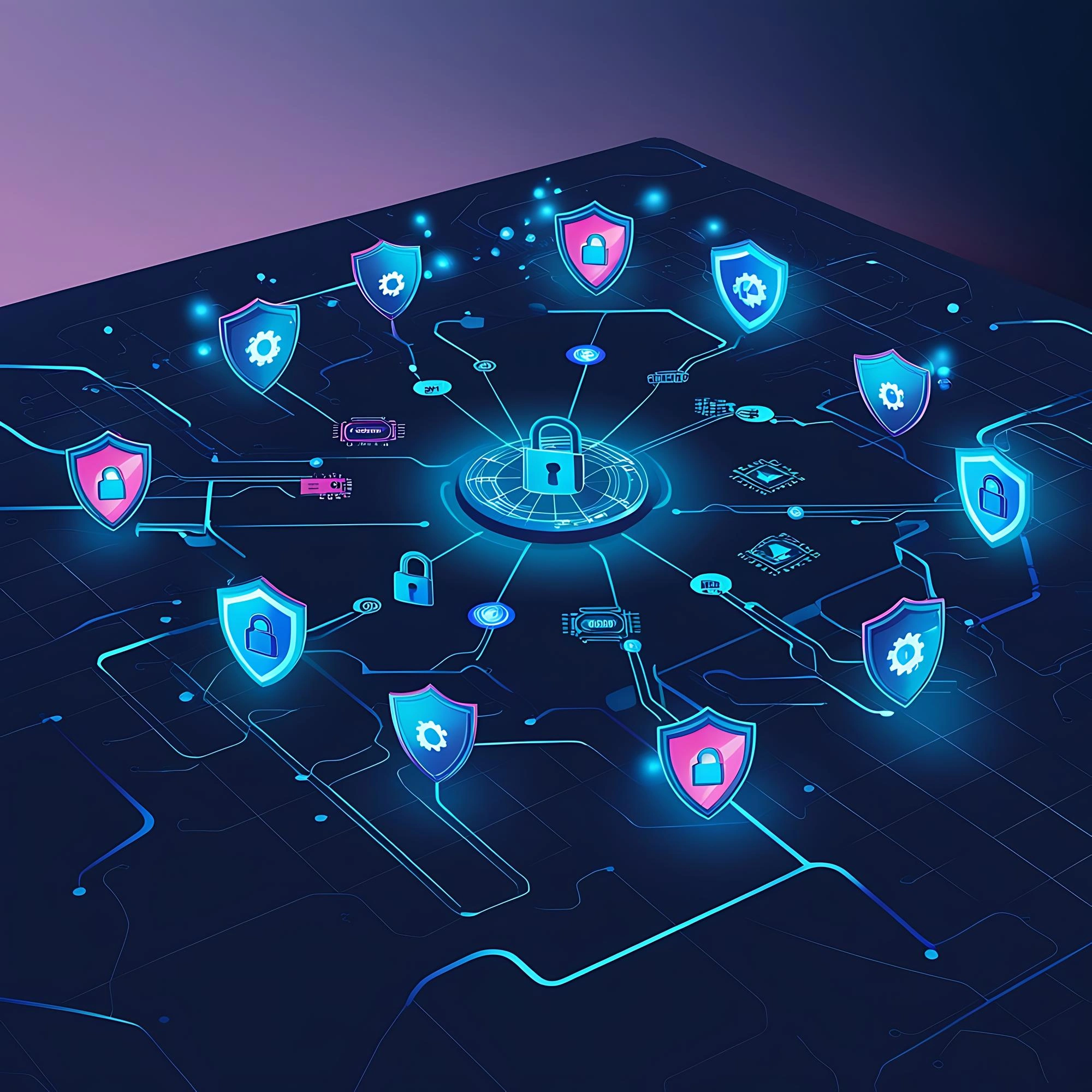Information / Cyber Security
In today’s fast-evolving, data-driven world, information security has outgrown its role as a mere IT concern and has become a critical business imperative that must be championed by leadership. To safeguard your organization effectively, a holistic approach is essential—one that integrates a diverse array of products and services to build a strong, resilient security foundation for the long term. This is where CShiine steps in as your trusted partner in information security, offering expertise and solutions tailored to meet your specific needs.
CShiine information security services are led by a team of experts who bring extensive experience in customizing security programs to meet the unique needs of any organization. Their combined knowledge and skills ensure that your security measures are not only robust but also precisely tailored to your specific operational requirements.

Vulnerability Assessment
Vulnerability assessment involves systematically defining, identifying, classifying, and prioritizing weaknesses in computer systems, applications, and network infrastructures. This process equips organizations with critical knowledge and awareness about potential threats, providing a comprehensive understanding of risks. By doing so, it enables organizations to effectively respond to and mitigate these threats, enhancing their overall security posture.
Threat Modelling
Threat modelling is a systematic process for identifying and enumerating potential threats, such as structural vulnerabilities or gaps in safeguards, and prioritizing appropriate mitigations. The goal of threat modelling is to provide a comprehensive analysis of the necessary controls and defenses, tailored to the specific characteristics of the system, the likely attacker profiles, potential attack vectors, and the most valuable assets. It addresses critical questions such as, “Where are my most significant vulnerabilities?”, “What are the most pertinent threats?”, and “What steps should I take to protect against these threats?”
Advanced Penetration Testing
Advanced penetration testing, or pen testing, involves simulating cyber-attacks on your computer systems to identify and exploit vulnerabilities. This process is crucial for assessing the security of various application systems, including APIs and frontend/backend servers. In the realm of web application security, penetration testing is often used to enhance the effectiveness of a web application firewall (WAF).
Penetration testing aims to uncover weaknesses, such as unsanitized inputs vulnerable to code injection attacks. The insights gained from these tests help refine WAF security policies and address detected vulnerabilities, ensuring a more robust defense against potential threats.
Dynamic Code Analysis
Dynamic code analysis involves testing and evaluating a program by executing it in real-time with live data. The primary goal is to identify and address errors as they occur during execution, rather than relying solely on offline code review. By debugging the program in all intended scenarios, dynamic analysis avoids the need to artificially create error-prone situations. This approach offers several benefits, including reduced testing costs and maintenance, elimination of redundant program components, and verification of compatibility with other programs.
Static Code Analysis
Static code analysis is a debugging method that involves examining a program's code without executing it. This process provides insights into the code’s structure and ensures it adheres to security standards and best practices. By analyzing the code statically, potential issues can be identified and addressed before runtime, helping to improve overall code quality and security.
Web Application Penetration Testing
Web Application Penetration Testing involves simulating unauthorized attacks, both internally and externally, to assess the security of web applications and sensitive data. This testing helps determine the potential for hackers to gain access to data via the internet, evaluates the security of email servers, and assesses the overall protection of web hosting sites and servers. By uncovering vulnerabilities and weaknesses, it provides valuable insights into how secure your web application environment is and where improvements are needed.
Mobile Application Penetration Testing
The Mobile Application Penetration Testing methodology is a specialized form of security testing aimed at evaluating the security of mobile environments. This approach focuses on assessing client-side safety, file system integrity, hardware vulnerabilities, and network security. By thoroughly analyzing these aspects, mobile application penetration testing identifies potential weaknesses and ensures that the mobile application is resilient against various security threats.
Network Penetration Testing
Network Penetration Testing, also known as pen testing or ethical hacking, involves systematically evaluating a computer system, network, or web application to uncover security vulnerabilities that could be exploited by attackers. The primary objective is to identify and address security weaknesses before they can be exploited maliciously.
Services Overview
Initial Assessment
Information Gathering
Vulnerability Mapping
Penetration Testing
Documentation and Reporting
Testing Services
CShiine offers a range of well-defined security testing services structured into distinct modules. The process begins with a comprehensive project management blueprint, which includes a kick-off meeting, discussions on change requests, scheduling, coordination with relevant resources, and detailed planning.
Penetration Testing: Following the initial planning phase, the penetration testing is executed. This involves thoroughly examining potential loopholes and identifying how a malicious hacker might gain unauthorized access or compromise fundamental security measures. Specialized consultants from CShiine conduct the penetration testing by exploiting identified vulnerabilities within the organization’s systems to assess the effectiveness of security controls and uncover potential risks.
Analysis of Vulnerabilities & Risk Assessment
Distinct from other information security consulting firms, CShiine begins its process by attempting to breach security with full authorization. This approach ensures a comprehensive assessment of vulnerabilities. Once the security has been tested, CShiine identifies and analyzes the vulnerabilities affecting the deliverables. The findings are then presented in detailed reports, offering first-hand insights into potential risks and weaknesses.
Testing Web Applications
Ensuring the security of web applications is crucial for protecting your data and the overall integrity of your organization. Web applications are often prime targets for attacks due to their vulnerability and critical role in an organization's digital infrastructure.
Many cybersecurity companies offer specialized solutions for web application testing, but the real challenge lies in integrating these security measures into the software development process. CShiine excels in this area with its specialized techniques and methods.
The information security consultants at CShiine conduct comprehensive web application testing using a variety of approaches, including:
Black Box Analysis:
Assessing the application from an external perspective without prior knowledge of its internal workings.
Static Code Analysis:
Examining the application's source code for vulnerabilities without executing it.
Third-Party Software Analysis:
Evaluating any third-party components integrated into the application for potential security issues.
Manual Penetration Testing:
Performing hands-on testing to identify and exploit vulnerabilities within the application.
These methods ensure a thorough evaluation of the web application's security posture, addressing potential risks effectively and efficiently.
Testing Cloud Security
CShiine Technologies provides specialized cloud security and penetration testing services designed to identify potential vulnerabilities within cloud infrastructures and network servers. This service helps organizations make informed decisions by offering actionable guidance and addressing security gaps.
Cloud Platforms Covered
Microsoft Azure
Amazon Web Services (AWS)
Google Cloud Platform (GCP)
Methodology
CShiine employs advanced methodologies divided into several key phases to ensure comprehensive cloud security assessments:
Planning and Threat Modelling
Reconnaissance
Vulnerability Identification
Exploitation
Remediation
Follow-up
Reporting
This structured approach ensures a thorough evaluation of cloud security, helping organizations protect their cloud-based assets and infrastructure effectively.
Specialized Tools and Methods
CShiine uses a variety of well-known tools and techniques to perform security assessments. Their team is highly skilled in these methods.
Tools
- Burp Suite: For scanning and analyzing web application vulnerabilities.
- Nikto: For detecting issues in web servers.
- Metasploit Framework: For testing and exploiting security weaknesses.
- Physical Penetration Methods:
- Impersonation: Pretending to be someone else to gain access.
- Persuasion: Using email, phone, or in-person techniques to get information.
- Direct Visits: Visiting locations to gather information or test security.
Which activities are included in security testing?
CShiine conducts security testing by finding open ports, monitoring network traffic, detecting devices and capturing data, and trying different logins to identify weak spots. They also check for database vulnerabilities through SQL injection testing, use tools to find security issues, search for weak passwords in databases, and test server responses to attacks. Additionally, they evaluate how system changes affect security and assess the security of user account creation. For comprehensive security testing, choose CShiine.
Detailed Reporting
CShiine provides thorough reporting on security testing engagements. Along with detailed vulnerability reports, they keep management and administration updated according to the project management plan. Any key milestones, achievements, or urgent issues are promptly communicated to ensure timely attention and resolution.
Assistance Expected from the Client
For successful project completion, clients are expected to provide access to necessary personnel,important documents, and a primary point of contact. Smooth coordination with the client’s team is crucial for the project's progress and achieving the best outcomes.
For further details on pricing, work processes, or any other inquiries, please reach out to the Client Service Executive at CShiine. Our team is eager to assist you with all your cybersecurity needs.





